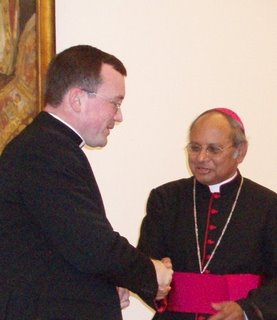Archbishop Ranjith and Fr Lang
 Archbishop Malcolm Ranjith, the Secretary of the Congregation for Divine Worship, recently gave an interview to Fides, the news agency of the Congregation for the Evangelization of Peoples. Here is a taster:
Archbishop Malcolm Ranjith, the Secretary of the Congregation for Divine Worship, recently gave an interview to Fides, the news agency of the Congregation for the Evangelization of Peoples. Here is a taster:Your Excellency, what is in your opinion the deep significance of the motu proprio Summorum Pontificum?Oh yes! We know all about that speech on this blog, don't we readers? :-)
I see in this decision not only the solicitude of the Holy Father to open the road for the reentry into the full communion of the Church of the followers of Archbishop Lefebvre, but also a sign for all the Church on some theological-disciplinary principles [which must] be safeguarded for its deep renewal, so much desired by the Council.
It seems to me that there is a strong desire by the Pope to correct those temptations [which are] visible in some circles which see the Council as a moment of rupture with the past and of a new beginning. It is enough to recall his speech to the Roman Curia on December 22, 2005.
There is also a sting in the tail as we are coming to expect from the venerable Archbishop:
It is felt that in some nations or dioceses rules have been handed by the Bishops which practically nullify or deform the intention of the Pope. This behavior is not appropriate to the dignity and nobility of the vocation of a Shepherd of the Church.There are extracts from the interview at Rorate Caeli and other extracts at Fr Z. The full interview (in Italian) is at Agenzia Fides and Rorate Caeli points to the English Fides Service where the official translation will be published soon.
Archbishop Ranjith is pictured above with Fr Uwe Michael Lang, author of "Turning Towards the Lord" and many excellent articles, the most recent of which was published in L'Osservatore Romano "Latin, a bond of unity between peoples and cultures." You can read the full text of a translation of the article on The Byzantine Forum. The article concludes:
The linguistic fragmentation of Catholic worship in the post-conciliar period has been pushed so far that the majority of the faithful today can only with difficulty recite a Pater noster together with one another, as can be noted in the international reunions in Rome or Lourdes. In an epoch marked by great mobility and globalization, a common liturgical language could serve as a vehicle of unity between peoples and cultures, besides the fact that liturgical Latin is an unique spiritual treasure that has nourished the life of the Church for many centuries. Finally, it is necessary to preserve the sacred character of the liturgical language in the vernacular translation, as the instruction of the Holy See Liturgiam authenticam noted in 2001.
